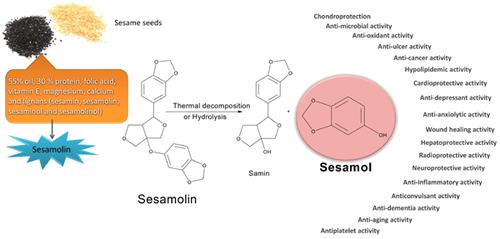Mini-Reviews in Medicinal Chemistry ( IF 3.3 ) Pub Date : 2020-06-30 , DOI: 10.2174/1389557520666200313120419 Bellamkonda Bosebabu 1 , Sri Pragnya Cheruku 1 , Mallikarjuna Rao Chamallamudi 1 , Madhavan Nampoothiri 1 , Rekha R Shenoy 1 , Krishnadas Nandakumar 1 , Vipan K Parihar 2 , Nitesh Kumar 1

|
Sesame (Sesamum indicum L.) seeds have been authenticated for its medicinal value in both Chinese and Indian systems of medicine. Its numerous potential nutritional benefits are attributed to its main bioactive constituents, sesamol. As a result of those studies, several molecular mechanisms are emerging describing the pleiotropic biological effects of sesamol. This review summarized the most interesting in vitro and in vivo studies on the biological effects of sesamol. The present work summarises data available from Pubmed and Scopus database. Several molecular mechanisms have been elucidated describing the pleiotropic biological effects of sesamol. Its major therapeutic effects have been elicited in managing oxidative and inflammatory conditions, metabolic syndrome and mood disorders. Further, compelling evidence reflected the ability of sesamol in inhibiting proliferation of the inflammatory cell, prevention of invasion and angiogenesis via affecting multiple molecular targets and downstream mechanisms. Sesamol is a safe, non‐toxic chemical that mediates anti‐inflammatory effects by down‐regulating the transcription of inflammatory markers such as cytokines, redox status, protein kinases, and enzymes that promote inflammation. In addition, sesamol also induces apoptosis in cancer cells via mitochondrial and receptor‐mediated pathways, as well as activation of caspase cascades. In the present review, several pharmacological effects of sesamol are summarised namely, antioxidant, anti-cancer, neuroprotective, cardioprotective, anti-inflammatory, hypolipidemic, radioprotective, anti-aging, anti-ulcer, anti-dementia, anti-depressant, antiplatelet, anticonvulsant, anti-anxiolytic, wound healing, cosmetic (skin whitening), anti-microbial, matrix metalloproteinase (MMPs) inhibition, hepatoprotective activity and other biological effects. Here we have summarized the proposed mechanism behind these pharmacological effects.





















































 京公网安备 11010802027423号
京公网安备 11010802027423号